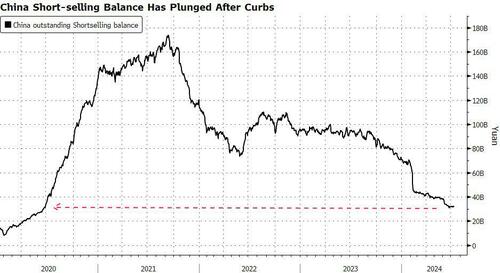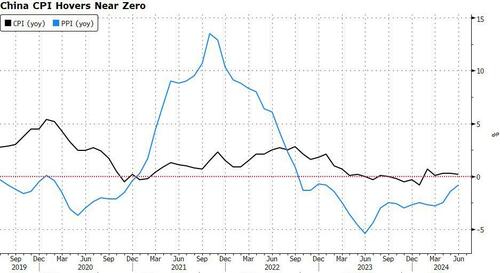
By Charlie Zhu and Helen Sun, Bloomberg Markets Live reporters and strategists
Three things we learned last week:
1. Chinese regulators intensified efforts to tighten their control over financial markets. The People’s Bank of China effectively narrowed its interest rate corridor, placing a much higher floor on the costs banks pay to borrow overnight from each other.
For longer-term bond yields, local branches of the National Financial Regulatory Administration asked some rural lenders to shorten the average duration of their bond holdings, joining the PBOC’s recent efforts to prevent yields from falling further.
For stocks, the securities watchdog took some of its most extreme measures yet to restrict short selling and quantitative trading strategies, providing a boost to some of the key indexes.
While recent policies have their respective rationale, they could come at long-term or macro economic costs, according to Nomura Holdings Inc. Measures to control the yield curve might mitigate financial risks, but weak domestic demand need lower interest rates to stimulate borrowings, economists at Nomura wrote in a report last week.
China’s financial industry has already been reeling from slower growth and regulatory crackdowns. Ping An Bank Co. is relocating more than 100 staff based in Shanghai to its Shenzhen home base to cut costs, while PricewaterhouseCoopers LLP is cutting staff across its China operations amid an exodus of corporate clients.
2. Domestic demand remains week despite efforts to stimulate consumption. The consumer price growth hovered near zero for a fifth month, with the statistics bureau attributing it to promotions for the annual “618” shopping festival.
“The deteriorating labor market will limit the potential for any quick and sustained recovery in consumption and hence inflation,” economists led by Zhou Yingke at Barclays Plc wrote in a report.
Meanwhile, credit expansion also missed estimates. Exports in June jumped more than expected, highlighting the importance of external demand in underpinning China’s economy. Together with weak imports, the country registered a record trade surplus.
3. Baidu’s tests of unmanned auto driving have reminded people the future has arrived. China’s Internet search leader is investing in generative AI and autonomous driving to diversify its business. With Beijing supporting robotaxis in ride hailing and car rental fleets, Baidu’s shares in Hong Kong posted the biggest weekly gain in more than one-and-a-half years.
By Charlie Zhu and Helen Sun, Bloomberg Markets Live reporters and strategists
Three things we learned last week:
1. Chinese regulators intensified efforts to tighten their control over financial markets. The People’s Bank of China effectively narrowed its interest rate corridor, placing a much higher floor on the costs banks pay to borrow overnight from each other.
For longer-term bond yields, local branches of the National Financial Regulatory Administration asked some rural lenders to shorten the average duration of their bond holdings, joining the PBOC’s recent efforts to prevent yields from falling further.
For stocks, the securities watchdog took some of its most extreme measures yet to restrict short selling and quantitative trading strategies, providing a boost to some of the key indexes.
While recent policies have their respective rationale, they could come at long-term or macro economic costs, according to Nomura Holdings Inc. Measures to control the yield curve might mitigate financial risks, but weak domestic demand need lower interest rates to stimulate borrowings, economists at Nomura wrote in a report last week.
China’s financial industry has already been reeling from slower growth and regulatory crackdowns. Ping An Bank Co. is relocating more than 100 staff based in Shanghai to its Shenzhen home base to cut costs, while PricewaterhouseCoopers LLP is cutting staff across its China operations amid an exodus of corporate clients.
2. Domestic demand remains week despite efforts to stimulate consumption. The consumer price growth hovered near zero for a fifth month, with the statistics bureau attributing it to promotions for the annual “618” shopping festival.
“The deteriorating labor market will limit the potential for any quick and sustained recovery in consumption and hence inflation,” economists led by Zhou Yingke at Barclays Plc wrote in a report.
Meanwhile, credit expansion also missed estimates. Exports in June jumped more than expected, highlighting the importance of external demand in underpinning China’s economy. Together with weak imports, the country registered a record trade surplus.
3. Baidu’s tests of unmanned auto driving have reminded people the future has arrived. China’s Internet search leader is investing in generative AI and autonomous driving to diversify its business. With Beijing supporting robotaxis in ride hailing and car rental fleets, Baidu’s shares in Hong Kong posted the biggest weekly gain in more than one-and-a-half years.
Loading…






